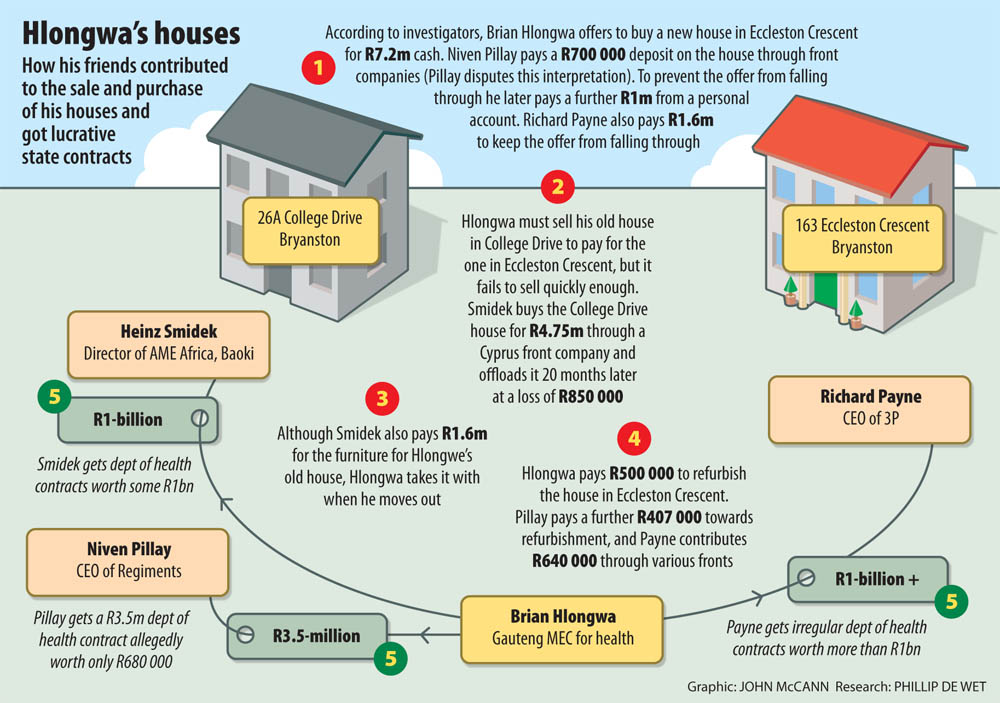Old news: The ANC Gauteng Chief Whip and former health MEC Brian Hlongwa says recent headline-grabbing allegations are not new. In fact
ANC Gauteng Chief Whip Brian Hlongwa says he attempted to hand himself over to the Hawks in relation to criminal allegations referred to in a now-public Special Investigating Unit’s (SIU) report released last week but was told that the South African Police Services unit would not be pursuing his arrest.
“In October 2014, the Hawks informed me that they had issued a warrant for my arrest — again, in respect of the self-same allegations which are now summarised in the SIU report,” Hlongwa said in a statement Monday.
“I arranged to hand myself over to the Hawks. My legal representatives had already prepared affidavits in support of the inevitable bail application when the Hawks informed me that, at that point in time, they would not be proceeding with my arrest.
“I am not privy to their reasons,” said the former Gauteng health MEC.
[Listen]: Five things the Gauteng health department spent your money on.
Last week, the legal advocacy nonprofit Section27 released a 122-page SIU report into alleged corruption at the Gauteng health department between 1 January 2006 to 14 May 2010. Hlongwa was Gauteng’s Health MEC from 2006 to 2009.
The report was handed over to former President Jacob Zuma in March 2017 but only made public after Section27 obtained it via a Promotion of Access to Information Act (PAIA) request.
The SIU report found that more than R1.2-billion was lost to graft during his tenure. Many of the significant allegations contained in the report are not new. The Mail & Guardian, for instance, repeatedly wrote about claims that the then chief whip may have improperly financed homes with money from contractors defrauding the government.
Take a look back: Here’s what the M&G found when it investigates who allegedly stepped in to buy Brian Hlongwa a home sweet home.

But the report does provide never-before-seen details of the alleged graft and come as the Gauteng health department continues to struggle with budget shortfalls. In fact, a shortage of funds led the department to cancel contracts with the Life Esidimeni private healthcare group in 2015 to provide care to state-funded mental health patients. Almost 2 000 patients were eventually moved, mainly into ill-equipped and dangerous community-based organisations. More than 144 people eventually died.
The accusations are not only old, Hlongwa says, but they are also regularly publicly debated.
“The allegations in the National Prosecuting Authority papers (now summarised in the SIU report) have been regularly ventilated in the Gauteng Provincial Legislature at least once a year since 2014.”
The Aids lobby group the Treatment Action Campaign and the nonprofit organisation Corruption Watch have asked multiple law enforcement agencies including Asset Forfeiture Unit why this public debate hasn’t translated into action. As of late last week, both groups were still awaiting a response.
While Hlongwa initially declined to respond to Bhekisisa questions on the SIU report last week, he issued a statement on Monday after having read the report. Hlongwa said that media reports were the first news he had that the SIU had finished its investigation into his conduct as well as that of his long-time friend Richard Payne, the former director of the controversial 3P Consultancy firm. The company, which has since liquidated, allegedly defrauded the Gauteng health department by using irregularly awarded contracts to bill the health department for everything from overpriced cricket hats to drafting the department’s own budget, which it never delivered.
Hlongwa maintains that he continues to cooperate fully with the NPA in regards to asset forfeiture proceedings it initiated in 2014 concerning property, including homes, that it alleges were “bought with the proceeds of corruption in respect of the department of health tenders”.
“Contrary to the impression created in the media therefore, the SIU report is not a new and sensational expose: the report is a summary of on-going legal process, the detail of which has been in the public domain for the last four years and which, I add, has been regularly reheated at strategic intervals primarily to embarrass the Gauteng ANC.”
The Gauteng health department also did not respond to requests to comment on the report, arguing that it had not seen the report. “We will study the report once we get access to it and all appropriate actions will be taken,” spokesperson Lesemang Matuka said. Presidential spokesperson Kusela Diko also did not respond to Bhekisisa’s requests for comment late last week.